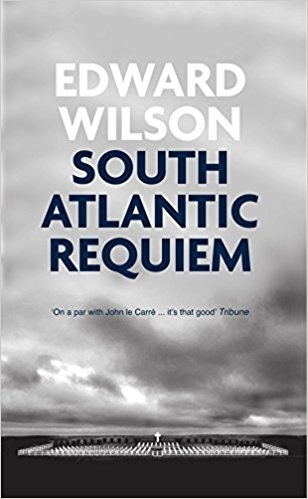This is the last article you can read this month
You can read more article this month
You can read more articles this month
Sorry your limit is up for this month
Reset on:
Please help support the Morning Star by subscribing here
South Atlantic Requiem
by Edward Wilson
(Arcadia Books, £14.99)
HE'S certainly done it again. Edward Wilson has breathed new life into his leftist British spook William Catesby who, in South Atlantic Requiem, appears once more at the epicentre of another crisis.

This time he's trying to bolster the Peruvian peace initiative eventually scuppered by Thatcher’s criminal decision to attack the General Belgrano warship as it headed away from the Malvinas in 1982.
Wilson's previous book ended with Catesby on a Suffolk beach as he awaited his fate for revealing the British and US Establishments’ long-term grudge against Harold Wilson, which resulted in the soft coup of 1976 and his resignation as Prime Minister that year.
Miraculously, he seems to have escaped assassination by his fellow spies at the Secret Intelligence Service. Not only that, but this Labour-voting servant of the British state is handed the Latin American desk at a time of growing military ambitions on behalf of the Argentinian junta.
He hires Fiona Stewart as an off-payroll spy in Buenos Aires — after all, the intelligence services like the armed forces, are at the receiving end of the first wave of neoliberal cuts. She's dating an Argentinian fighter pilot and her largely anecdotal and pillow-talk accounts of the comings and goings of high-ranking military types prove far more prescient than anything arriving from official channels.
Wilson describes a country crushed under a stultifying upper-class orthodoxy, economic corruption and violent political oppression. Yet the Argentinian military are calculating that the capture of the Malvinas will unite even the oppressed leftists and trade unionists to their cause.
At the same time, the novel captures the heartless hypocrisy and calculation of Thatcher, single-minded about the need for war in her whisky-sodden cups and is happy to play the US along with the fiction that the task force could be halted.
Catesby once again emerges as an undercover Everyman — he's conveniently at the centre of the action, including the capture of a French engineer and is part of a hit squad taking out Argentinian agents in Europe.
Yet Wilson saves the book from these overblown Bondesque incidents, by focusing more on Catesby’s painfully convoluted three-dimensional negotiations with diplomats and politicians and through his own mounting anger at the forces determined to deliver a south Atlantic conflict.
Wilson, an able writer, combines the detail of a historian with the pathos and humour readers have come to expect from the Catesby novels.
The book ends 30 years on as Catesby, browsing the shelves of the Halesworth Co-op for wine, bumps into the widow of a British officer killed by Thatcher’s adventurism.
Yet even at the age of 90, I’m not sure we’ve heard the last of this intriguingly contradictory creation. I certainly hope not.










